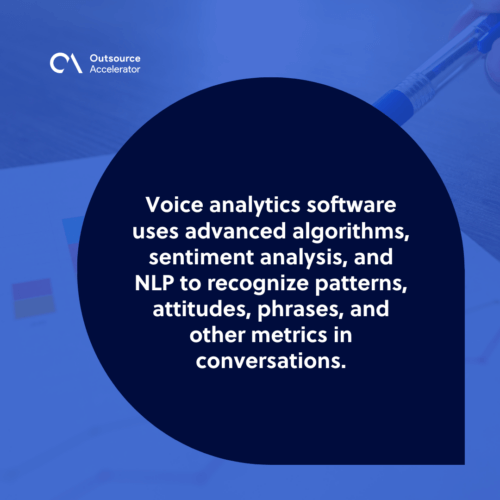Maximizing sales with voice analytics: A handy guide

In the ever-changing customer demands, staying ahead of the competition in sales is critical. Voice analytics has emerged as a game-changing technology, offering sales teams a rich advantage.
According to Finances Online research, the analytics market is expected to expand to a $57 million sector by 2023. The advanced analytics will dig deep into customer interactions, sales presentations, and team dynamics by utilizing the power of natural language processing (NLP).
In this comprehensive guide, we’ll explore the inner workings of voice analytics in sales, its diverse applications, and future trends that promise further elevating sales performance.
We’ll also outline steps to seamlessly integrate voice analytics with your existing sales systems to drive tangible results and unlock unparalleled sales success.
How does voice analytics work in sales?
Voice analytics uses modern technology to monitor and interpret speech conversations between sales reps and customers.
The procedure usually begins by recording user interactions, whether over the phone, via video conferencing, or in person. The captured data is subsequently converted to digital format and examined extensively.
Voice analytics software uses advanced algorithms, sentiment analysis, and NLP to recognize patterns, attitudes, phrases, and other metrics in conversations.

This research provides significant insights that assist sales teams in making data-driven choices and improving overall performance.
Let’s look at some significant ways voice analytics work in sales:
Identifying sales opportunities and trends
Voice analytics has the capability to detect sales opportunities and trends. By studying client interactions, sales managers can:
- Spot reoccurring pain areas
- Objections
- Cmmonly asked questions
With this knowledge, sales teams may adjust their efforts to meet unique problems and boost customer satisfaction.
Additionally, speech analytics may assist in identifying and developing patterns in client preferences and habits.
Understanding these trends allows firms to modify their sales strategies, product offers, and marketing messaging to remain ahead of the competition and satisfy changing client needs.
Optimizing sales scripts and pitches
Sales scripts and pitches are crucial in persuading potential customers and closing deals. But crafting the perfect script can be challenging without objective feedback—voice analytics steps in to offer an objective evaluation of sales pitches.
The software can analyze the effectiveness of sales scripts by measuring tone, language, and persuasive phrases. It can identify whether sales representatives are sticking to the approved script or improvising successfully.
With this knowledge, sales managers can fine-tune scripts and provide targeted coaching to their team members to improve their pitch and increase conversion rates.
Enhancing customer engagement
Customer engagement is critical in building long-lasting relationships and fostering brand loyalty. Voice analytics allows businesses to gauge the level of engagement during customer interactions.
With these insights, sales teams can adapt their communication styles, actively listening to customers, addressing their concerns, and maintaining a personalized and engaging dialogue.
Improved customer engagement leads to higher customer satisfaction and increased chances of repeat business and referrals–this is what voice analytics aims to achieve.
Targeting prospects with precision
Identifying the most promising prospects in sales is vital for maximizing conversion rates. Voice analytics can aid in this process by distinguishing key attributes that make them more likely to convert.
As noted earlier, voice analytics can:
- Analyze previous successful interactions with customers
- Determine buying signals exhibited by consumers who eventually purchase
- Pinpoint specific language patterns
- Identify interaction tonalities
Sales teams can focus on prospects who exhibit similar traits, leading to higher efficiency in the sales process.
Monitoring sales team performance
Voice analytics offers a powerful tool to objectively assess individual and team performance. Sales managers are given access to comprehensive data on call volume, call duration, and even sales representatives’ speaking speed and tone.
This data-driven approach to performance evaluation enables managers to do the following:
- Identify top-performing sales representatives
- Track improvements over time
- Pinpoint areas that need further development or coaching

Improving team coaching
Voice analytics improves sales managers’ coaching process. This advanced analytics may personalize coaching sessions to specific issues or possibilities.
Coaching sessions may be tailored to improve this critical part of client interactions if the program identifies a lack of active listening abilities.
Sales managers may also use speech analytics to identify outstanding sales conversations and share them with the company as best practices. This develops a positive team culture and promotes ongoing learning and professional development.
Voice analytics: Future trends for sales
According to McKinsey’s assessment of over 1,000 sales firms worldwide, 53% of those high-performing companies consider themselves successful consumers of analytics.
This only means that as technology evolves, voice analytics and other advanced technologies open up new opportunities for sales teams to boost their performance.
Here are some exciting future trends for voice analytics in sales:
Integration with AI and machine learning
Integrating voice analytics with AI and machine learning will make the software more accurate and efficient. AI algorithms can help identify more nuanced patterns and provide deeper insights into customer behavior and preferences.
With machine learning, voice analytics platforms can adapt and improve over time as they process more data. This adaptive capability will make the analysis more contextually relevant and valuable for sales teams.
Voice-powered virtual sales assistants
Virtual sales assistants powered by voice analytics and AI will revolutionize how sales representatives work.
These assistants can join sales calls and analyze real-time data. They also provide objectively valuable suggestions and talking points for the sales representative based on the customer’s behavior and sentiment.
An AI-powered assistant in the sales process can streamline interactions, boost sales representatives’ confidence, and enhance the overall customer experience.
Voice-enabled CRM systems
Customer relationship management (CRM) systems are crucial for managing customer data and interactions.
Voice-enabled CRM systems will make data entry and retrieval faster and more accurate. Instead of typing notes after each call, sales representatives can dictate their observations and have the CRM system automatically process and categorize the information.
This seamless integration will save time, reduce manual errors, and ensure that critical customer data is always up-to-date.
Predictive sales analytics using voice data
Leveraging voice analytics can make predictive models more accurate and granular, and using voice data can help sales managers to do the following:
- Anticipate customer needs
- Identify opportunities for cross-selling and upselling
- Forecast sales performance more accurately
Integrate voice analytics with your existing sales systems
Now that you understand the potential of voice analytics in maximizing sales, the next step is to integrate it with your existing sales systems effectively.
Here are steps to help you achieve a seamless integration:
- Evaluate your sales goals. Identify the areas where voice analytics can have the most significant impact and align its integration with your broader business strategy.
- Choose the right voice analytics software. Consider factors like scalability, ease of integration with existing systems, and the vendor’s level of support.
- Provide training and support. Offer ongoing support to your sales team to address any challenges or questions that may arise during the integration process.
Businesses can unlock their competitive edge by embracing voice analytics and seamlessly integrating it with existing sales systems. On top of that, it allows them to deliver exceptional customer experiences consistently!







 Independent
Independent




